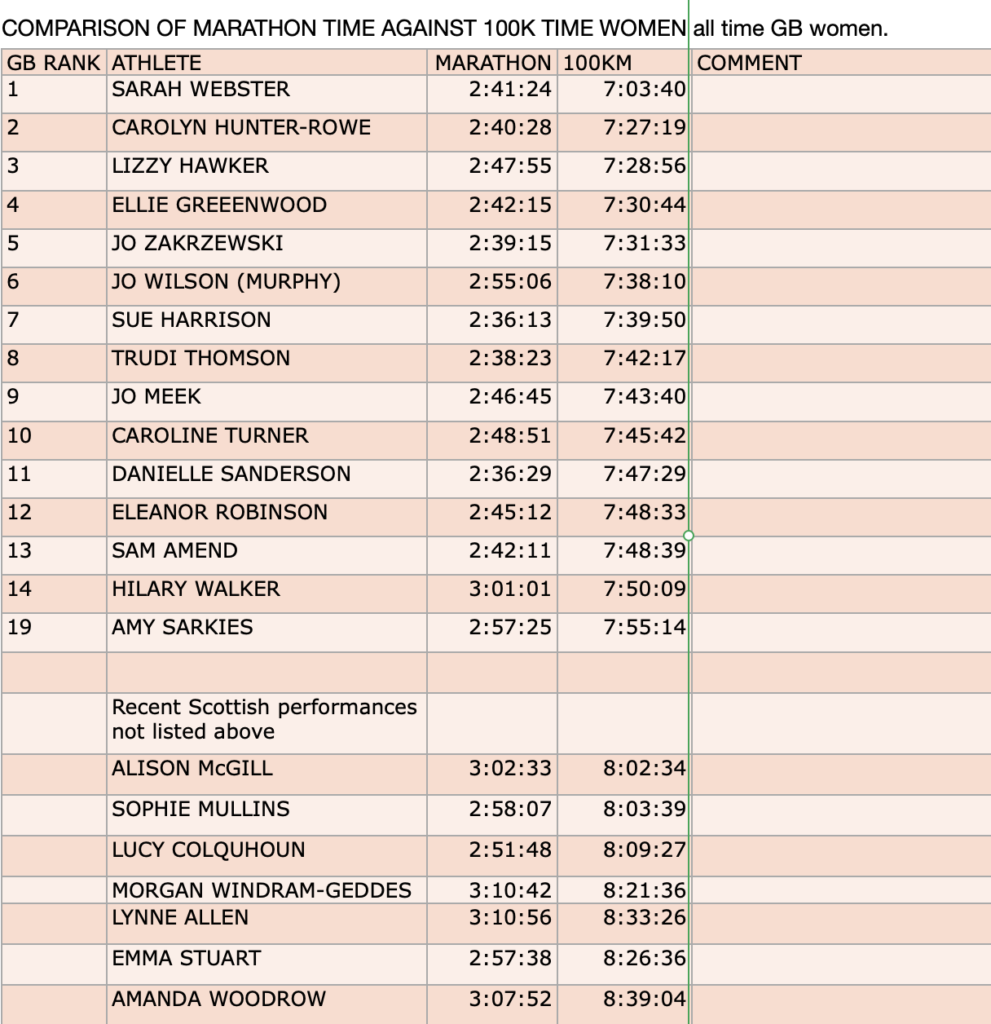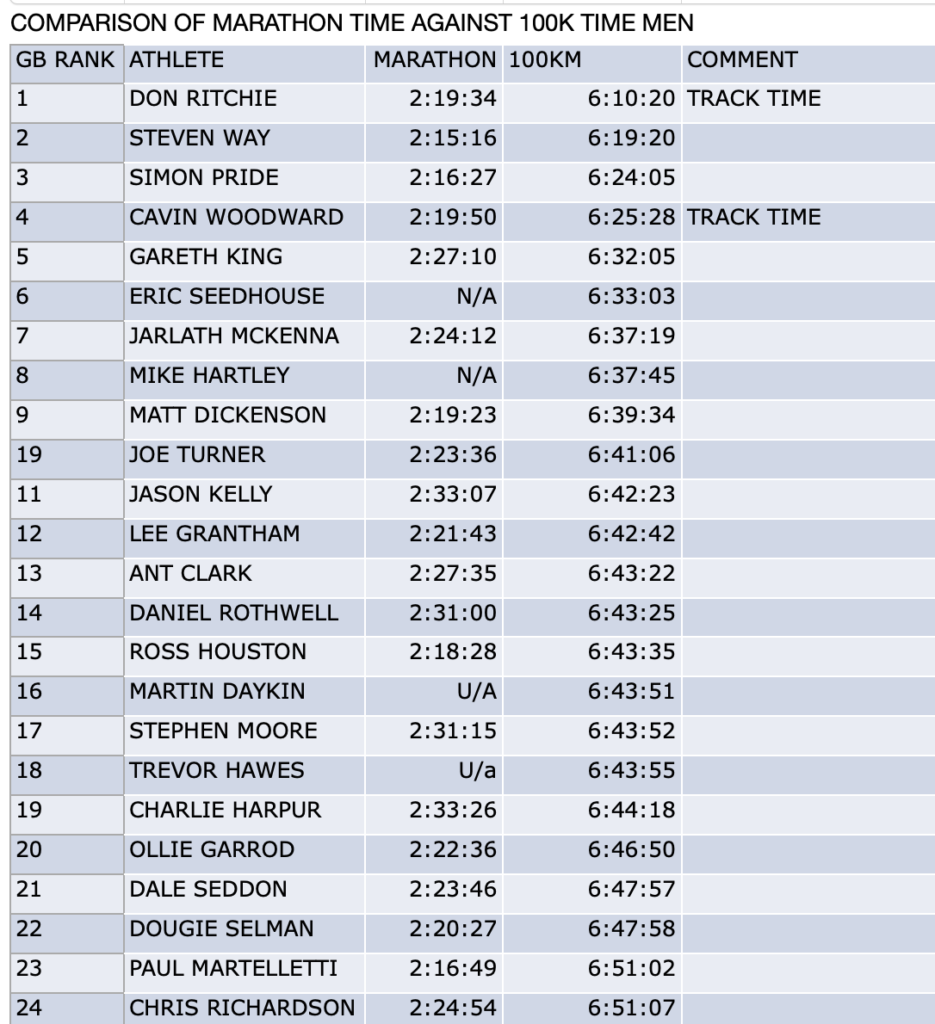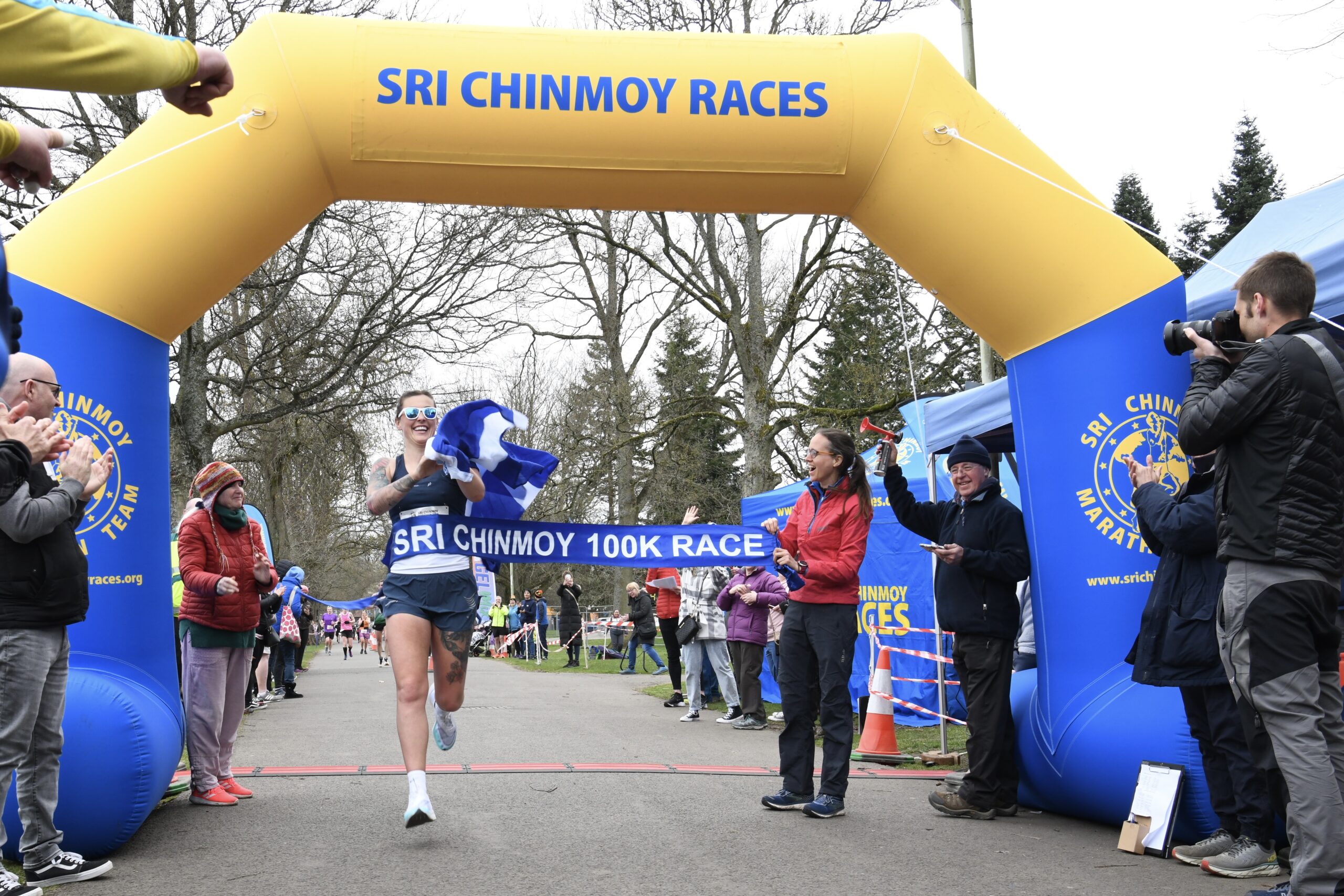Can you predict your 100km time?
An issue for many runners who have ever thought about trying a road 100km is, could you predict your 100km time? Athletes and coaches will try predicting marathon times from half-marathon times. They will, just as importantly, look at recent training logs.
Sorry! This post is not a definitive, peer-researched study that will make you predict with foolproof 110% accuracy your 100k time. It will make anyone think, could I run a respectable 100k race for my ability? The answer to this is a resounding yes. As long as you have that initial inner motivation to sustain you, commit to the training and any training block goes well. Although the times mentioned are at the elite end, the principle thinking will apply, for any standard of runner.
All I have done here, is compiled a comparison of the top all-time GB 100k-ranked runners and their marathon times while making a few observations. I have also, in addition, listed a few other Scottish runners who have taken on the challenge of a 100km for comparison.
If you like doing this, you can play fantasy athletics and try and predict other runners’ times.
Marathon and 100km Predictions
Tim Noakes, the author of The Law of Running, has a theory. If you multiply your half marathon time in minutes by 2.11, you get your predicted marathon time in minutes. Another study suggests taking your average minutes per mile, adding 20 seconds and multiplying by 26.2.

I am sure in this age of ever-increasing sports science, many studies by professors, coaches and sports science students have helped devise an easy-to-understand formula. Similar formulas have been put forward for 100 kilometres. However, as the distance increases, there are, in my experience, too many variables to make predictions that sit easily. Possible variations include wind and temperature, nutrition, severity of the course, the strength of the competition and personal experience.
Comparing the Top GB Women and Some Newcomers
The top listings are the current all-time British 100km rankings and some recent home countries performances.
There are a few things to ponder in predicting your 100km times.
Most 100km runners do have credible marathon marks to their name.
However, if you were to look at their form around the time of their best 100k performances, you would see most had a constant few years of consistent quality racing and training. This training enabled each runner to learn through experience not how to run an ultra race but how to race an ultra event.
It is a fact that most of the top times here, apart from Sam Amend’s, were achieved in a World or European Championship event. In most cases, individual or team medals were at stake. Hunter-Rowe, Hawker and Greenwood, were able to hold off strong opposition to strike gold, indicating that keen competition is a factor in performance motivation.
Amend’s time, nonetheless, was in a British Championship where competition was also good. One outlier here is Hilary Walker. Of all the women who have run 7 hours 50 minutes or less, she is the only one who hasn’t broken three hours for the marathon. This is mainly because most of Walker’s marathon times were run within a training block for an ultra race, with no tapering or marathon specificity. She achieved many excellent ultra performances. On her admission, she never had the natural speed of others but could maintain a steady pace for several hours. Preparing for ultras when she was at her best always took priority over consciously improving her marathon time.
Rate your
Predicting men’s 100 km times versus marathon times.
Like the women, most of the fastest 100 km times were achieved in championships. Like the marathon, tactics may dictate how the race unfolds, rather than the clock. It is interesting, that two of the fastest times, Ritchie’s and Woodward’s, were set in a track race.

See HERE for an article on Ritchies’ fastest 100km time of 6:10:20.
It wasn’t a championship race, however, both events had ideal conditions, and both athletes were brought up on the tradition of racing hard and racing often. Analysing the splits of both runners, you can see they paid scant attention to even pacing, hanging on despite clearly slowing in the later stages.
Contrastingly, Matt Dickinson, Gareth King, Jarlath McKenna, Jason Kelly and others who have some of the fastest men’s times in the last two years, all ran relatively even splits in their best 100km races.
Kelly’s and Dan Rothwell’s marathon times, like Hilary Walker’s, are probably due for revision when they choose to focus on a marathon for a few months.
What conclusions can we draw on predicting your 100km time?
Are there any simple conclusions to draw and offer to someone thinking of running 100km for the first time or improving their performance?
- It should be noted, that the perceived myth that training for an ultra will lead to you running slower marathons is just that, a myth.
- `For several of the runners listed here, men and women, their fastest marathons were achieved, once they had an ultra background. If the speed/endurance mix is right, history shows that good marathon times and ultra-distance times up to 100km can be mutually achievable.
- As stated earlier, this can apply not only at the elite level but whatever your standard. Only slight tweaks in training from a successful marathon schedule are required to run a competent ultra up to 100km distance. And the same applies to someone from an ultra background who wants to focus on improving their marathon time.
- It goes without saying that in this time where so many runners and coaches are using “Zonal training” your ability to hold your estimated optimal race pace in a long/medium training run can give personal feedback on your realistic goals and provide an insight into your windows of where your plan A, B or C should lie.
- Along with the necessary and inevitable hard, physical outer training, There is always the X factor of the “ Inner training” or what I have loosely observed as being a runner’s ability to problem solve or just, ”Deal with themselves, in the moment, on the move”. There is a priceless ability, honed over many years through personal experience and the wise wisdom of coaches or good friends, to observe what is happening to your body during a race, recognise it, and adapt pace or fuelling to keep on track.
- There is also a priceless ability, with marathon runners but especially ultra runners, to recognise that on a given day, absolutely everything has fallen into place. After the necessary ritual of easing your way into the race, knowing you are feeling so comfortable that you don’t quite understand it. Those are the rare days when you might consider, knowing there will be so few days in life like this, to throw caution to the wind and go for it, knowing things might get interesting in the later stages, but also knowing you have the training behind you and the tools to deal with it. Those are the days, whatever your standard, when magic happens.
Prepare well, know your body and understand what realistic pace you can hold for several hours.
You can read more on the 2022 GB men’s and women’s rankings HERE. And 2023 rankings HERE.
This post is an update of a previous post
PLEASE SHARE!
If you have enjoyed this post, do see our other ones HERE
If you have a comment, please feel free to add it below.
If you are inspired by this or think someone else you know will be, please do what you have to do by sharing. You all know how these things work by now:-) You can also follow me on Twitter and Instagram @tarittweets
Sign up to receive our newsletter alerting you to new posts
Adrian Tarit Stott.
The author is a former GB 24 hour ultra international with over 100 ultra race completions. He has also been involved organising ultra distance races for over 30 years. Still an active recreational runner, he is currently a member of UKA’s Ultra Distance Advisory Group (URAG) and part of the selection and team management for both Scottish and GB ultra teams.He is also a freelance writer, contributing articles and reports to several websites and magazines including Athletics Weekly and Irunfar.
